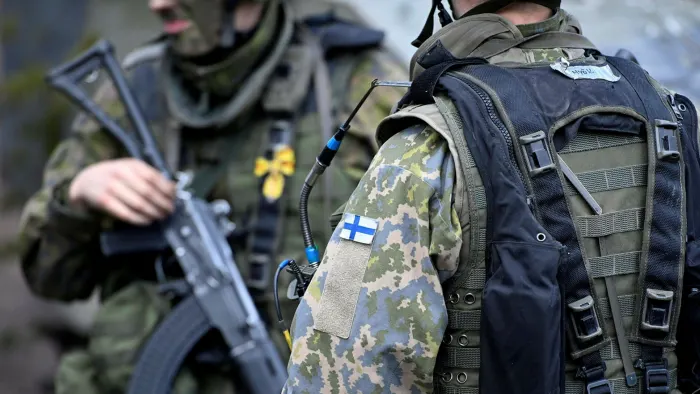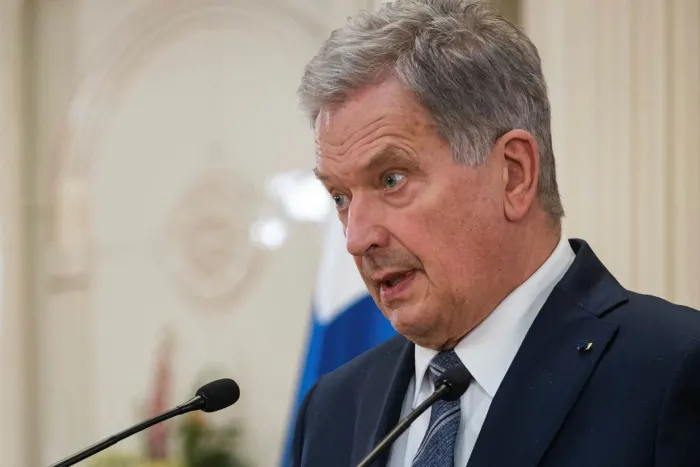Finland and Sweden signal paradigm shift with push to join NATO
Russia’s invasion of Ukraine has ushered in historic policy change that is backed by public

There can be no other word for what happened in Finland and Sweden this weekend but “historic”.
For decades in Finland’s case and centuries in Sweden’s, the thought of joining a military alliance was all but impossible. Now, in the 81 days since Russia launched its full-scale war against Ukraine, the situation has changed so dramatically that Sweden and Finland are rushing into Nato with large majorities in both their parliaments and populations backing them.
“It’s a big step in our western integration, it is finalising it. Yes, for the country it’s a change in paradigm,” said Tytti Tuppurainen, Finland’s EU minister.
But she also added: “You could interpret it as a very natural process as well. It’s no wonder that Finnish public opinion turned in such a short time. It tells the story of decades of preparation. In that sense, it’s not any giant step. When the time was right, the readiness was there.”
Finland has a history of using periods when its larger neighbour to the east is distracted or weak to make big decisions. It declared independence in 1917, weeks after the Bolsheviks seized power in Russia.
“We’ve always tried to adjust, and when there’s a window of opportunity we’ve tried to use it,” said Elina Valtonen, deputy head of the main opposition National Coalition party, a longtime supporter of Nato membership.
Finland’s government, together with the President Sauli Niinistö, took the decision to apply on Sunday. Parliament is likely to ratify the move on Monday or Tuesday by a huge majority, and the application could be sent jointly with Sweden on Tuesday or Wednesday when Niinistö makes a state visit to Stockholm.
The scale of the change is far bigger in Sweden. Its 200 years of military non-alignment have left a deep imprint in the DNA of many Swedes, especially those in the governing Social Democrats party. They decided on Sunday evening to jettison that and seek Nato’s embrace, not least because Finland was doing so.
“Sweden would end up in a very vulnerable situation if we alone chose not to apply for Nato membership,” said Prime Minister Magdalena Andersson.

Finland’s president Sauli Niinistö said his message to Russia would be: ‘You caused this. Look at the mirror’ © Alessandro Rampazzo/AFP/Getty Images
In Helsinki, Finland’s assured progress towards Nato membership has been a triumph for its brand of serious policymaking, which has long set store on being prepared for the long term and never letting their guard down on Russia. There is a sense among many that Sweden is benefiting from Finland’s hard work, including the diplomacy to win over the 30 existing Nato members. “They will owe us big when this is over,” said one Finnish official.
Finnish politicians are expecting “speed bumps” on the road to membership — such as Turkey’s potential opposition — but are convinced these can be overcome, and that within 4-12 months they and Sweden will be members. Nato officials have promised a smooth process and that both countries could be formal invitees, able to attend all meetings, in just a week or two.
Reprisals from Russia — possibly in the form of cyber or hybrid attacks — are possible but Finnish officials are so far pleasantly surprised that Vladimir Putin has not done much to influence their decision. “No Finn has to be threatened or feel insecure — whatever comes we’re prepared,” said Valtonen.
Niinistö said the change for Finns would not be so obvious in daily life, but more in their heads. “If you know that you have a secure country to live in, and build and work, that has an impact to all of your behaviour. Even if you don’t remember it daily, it gives security of mind. It is of huge importance,” he added.
Prime Minister Sanna Marin said it would “change some things but not others”. One area where it could well have an impact is Finland’s assertiveness towards Russia.
For decades during the cold war, Finland was forced to adapt its policies to keep the Soviet Union happy, leading to the term Finlandisation, a hated expression in the country today. In the decades since, it has striven to keep good relations with Russia, something now shattered.
Niinistö, known for his sometimes gnomic utterances, has been clear and direct over Russia’s responsibility for Finland’s Nato membership. “You caused this. Look at the mirror,” he said his message would be to Russia on Wednesday.
Valtonen said: “You can see it in the rhetoric. Traditionally Finnish foreign policy rhetoric has been almost cryptic. Now it’s open and straightforward. The biggest change is in the mind. We are finally free for real.”
Tuppurainen agreed: “This is a new Finland. Everybody understands that appeasement doesn’t work any more. At last this is the time where we can talk about Russia and its regime with frankness. It’s a totalitarian regime.”
Finns and Swedes alike have been at pains to insist that their decisions are being taken to maximise their own security, and are not against Russia or anybody else. They are also set to boost the security for the three Baltic states by making them easier to defend.
But there is also a clear sense that one of the biggest consequences of Putin’s invasion of Ukraine will be to make northern Europe and the Baltic Sea a Nato area — just what he wanted to avoid.
Tuppurainen added: “When we saw the true face of alleged war criminal Vladimir Putin, Finns decided now is the time to use the option. It’s a one-of-a-kind opportunity. If you don’t use this option now, it might be gone forever.”
